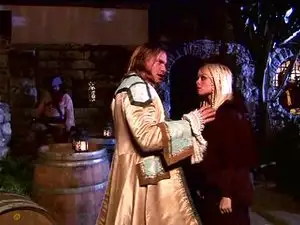Demon And Demeanour. Book 4 Of Poacher's ProgressChapter 12: Who Let The Dogs Out? free porn video

I gave orders for Lewis Armstrong to maintain a close watch on the factory in case some of the more hot-headed of the Crowcombe villagers decided to set it on fire, and then rode back to Stogumber, wondering if the Clark of Brackstone/Braxton was really Cornelius Braxton-Clark, and even if he were would Silas Maddox be with him?
On my arrival at ‘Muscovy’ I found Ivan Crossley had arrived, along with Miles Davis and his company. I quickly apprised Ivan of the situation in Crowcombe, and he visibly relaxed when learning the crowd was dispersed without a ‘whiff of grapeshot’ having being employed.
“I feared bloodshed might ensue; the villagers are mightily enraged with Clark. He has fuelled their rage by employing unskilled men to work at his factory, and then enlisting those ruffians to guard it,” he said.
“Those ‘ruffians’, as you call them, are decent men, former soldiers trying to feed their families. Anyway, I have persuaded them to leave Clark’s employment, and hope you might find them work as Tipstaffs, or something similar?”
Ivan Crossley’s face brightened. “Indeed, I can find use for such men, given your regard and approval of them. Shepton Mallet will be ‘hosting’ many itinerant apple pickers when the orchards are harvested, and there is always trouble between the locals and the incomers. A dozen stalwart former soldiers will be most welcome, and I will swear them in as soon as they reach Taunton.”
Mr Jackson and his men would be overjoyed when I passed on that information to them the next morning.
I then asked Crossley what he knew of Clark of Brackstone.
What he told me convinced me that Clark was the man I sought, as Clark the factory owner had once been Clark the butcher, and had been born locally in Brackstone/Braxton.
“Clark made his fortune supplying beef and pork to the Royal Navy victualing yard at Bristol, and left the area after selling the business for a tidy sum. I heard he had brought an estate somewhere near London. However, either ill-chosen business deals or malpractice caused his downfall, and he reappeared in Crowcombe nearly three years ago.”
“But he owns a factory, so must have acquired a substantial fortune since his arrival back here?” I said.
Crossley pursed his lips in annoyance. “Chicanery, pure and simple. He bought a share of the factory, which was then owned by Stanley Kenton. Somehow Clark cozened Kenton to hand over complete control of the enterprise to him. Six months later Kenton was a pauper and Clark moved into Kenton’s house in Brackstone. Kenton died in the workhouse a month ago. I looked into the various business transactions which had taken place, and all appeared legal and above board. Kenton had, inconceivable as it seems, made over the business, and his home, to Clark without any payment.” Crossley’s face showed his amazement at such a move by Kenton.
I asked if Ckark had any staff at Brackstone.
Ivan didn’t know, but Peter Crossley, who had entered the room during our conversation, interjected. “He has a slattern of a cook-cum-housemaid living in, and there is a fellow who comes and goes, but never shows himself in the village.”
Next morning I set out for Quantock House, Clark’s residence in Brackstone, accompanied by Miles Davis and half of his company.
Quantock House had seen better days. It was a medium sized, two storey, dwelling, built sometime near a hundred years ago. All the woodwork needed a coat of paint; many roof tiles required replacing, some windows had shattered glass, and the whole building gave the impression of neglect and decay. It stood in a substantial area of what had once been carefully tended parkland, but now resembled a jungle, with fallen trees and thickets of brambles. Away in the distance could be seen Wills Neck, the highest point of the Quantock Hills.
The short drive to the house was rutted, and the rusted iron gates were hanging drunkenly on their posts. I left the half company at the gate and rode up to the front door. I found a picketing post for my mount and hammered on the door. Getting no reply, I walked around to the back of the house, forcing my way through dense undergrowth.
There were stables at the rear of the house, and sitting by a stable door were the men under Mr. Jackson’s command. He himself came out from a stable as I approached.
“Have you been paid yet, Mister Jackson?” I asked, and he nodded.
“Aye, but the skinflint was not about to hand over our pay, until I threatened him with Tig here.” He pointed to a giant of a man, who wore the most ferocious of expressions on his saturnine face, and I admit he fair put the wind up me. Jackson laughed when he saw my anxiety.
“Don’t fret thee sen, sir. For all his appearance Tig is as gentle as a kitten.” He paused, “Mind you, if he gets a flagon of scrumpy down his gullet he becomes a savage, and would take on the Imperial Guard single handed.”
I told Jackson of the offer of employment from Ivan Crossley, and he was delighted by the news and shook my hand, as did the rest of his fellows when he relayed the information to them. Tig’s huge hand enfolded mine, and he spoke with the soft voice of a young girl,
“Thank you, Colonel. I will not let thee, nor the magistrate down, and will not touch a drop of scrumpy.”
Jackson laughed. “You can rely on Tig’s word, Colonel, and we will look to see that he keeps it.”
Before they set off for Taunton, Milton Jackson told me the front door was so warped it could not be opened, and entry to the house was via a back door by the kitchen.
“Although I would be lothe to eat any food that came from that cess pit.”
As I entered through the kitchen I noted the grease and grime on the floor, table, and the utensils, and tended to agree with Milton Jackson.
I shouted out, and heard an answering voice in a room halfway along a corridor. I pushed open the door into what was obviously not only the study but dining room as well, and judging by the amount of blankets and other garments on the floor, also the bedroom. Seated behind a paper and bottle strewn desk was Clark.
I had never met Cornelius Braxton-Clark, but the figure behind the desk had enough of the features of Jarvis Braxton-Clark for me to identify him as the man I wanted. He had the physique of his son, but muscle had turned to fat, and he bore all the signs of a confirmed toper. His eyes were sunken, his face pockmarked, and around his mouth were several unsightly sores. He noted me staring at his half-bald pate, dotted by sparse clumps of grey hair, as if handfuls had recently fallen out.
“The cure for the pox can sometimes be worse than the disease itself, “ he said, indicating his head. “I am Cornelius Clark — are you the man who has sent away the scoundrels I employed to protect my property?”
“I have saved you money, Mister Clark. Your property is now being guarded by the Lincoln Militia, who are paid by the County of Lincolnshire. I am Colonel Greenaway of that regiment.”
“Well, I am glad my money and property is safe. Greenaway? Do I know you? The name is familiar, but I cannot bring it to mind why that should be.”
I surmised the pox was affecting Clark’s brain, as I was certain Maddox would have told him the name of the man who had shot and killed his son.
Clark sat up straighter in his chair. “My factory, now threatened to be destroyed by ne’er–do-wells and malcontents, is all I have left of my fortune. I tried to better myself by marrying my son into the nobility, but all I achieved was bankruptcy and the death of my son.” He abruptly stopped speaking and looked at me closely. “Greenaway you say? I’m sure I know that name.” He shook his head, as if trying to jolt free the knowledge from his memory, and then continued with his tale. “The war with France ended, and so did the monopoly of West Indian sugar. Prices plummeted, and I lost more money. My estate manager was a blackguard and a scoundrel, who fleeced me while I was fully engaged in trying to recoup my losses. He ran off with several thousand guineas, and Nancy, a housemaid who not only shared my bed but also the knowledge of where my money was hidden.”
“Would your former estate manager be Swithin Blaydon?” I enquired innocently.
“You know the rascal? If he was a friend of yours then I will enjoy telling you he danced his life away on the gallows in Bristol.” He gave a cackle of laughter. “It was only by chance I was in the city that day, dealing with a creditor, when I spotted Blaydon and Nancy. Two week had passed since the thieving pair skipped off with my money, and they had been waiting for a berth on a ship bound for the Americas. I had them arrested and charged with theft, and then persuaded Nancy to turn King’s Evidence. Blaydon ended his life choking at the end of a rope and shitting himself — a fitting end for such craven rogue. As for Miss Nancy, I sold her to a dock side brothel owner, and watched as the entire crew of a recently returned whaler had their way with her.”
I had no sympathy for Swithin Blaydon. He had supped with the Devil when he failed to appear as a witness at the Court of Inquiry investigating Jarvis Braxton-Clark’s conduct during an attack on the Kennet and Avon Canal in 1816. Instead he resigned his commission, and took employment as estate manager with the Braxton-Clarks at Braxton Hall.
Clark had not finished crowing over Blaydon’s demise. “The money retrieved from Blaydon enabled me to buy a share in a factory owned by a fool named Kenton. They say a fool and his money is soon parted, and six months later I had the factory and this house off him.”
“How did you accomplish that?”
He guffawed with laughter. “Kenton had not been with a woman since the end of the last century, and he lusted after my maid Bathsheba. I allowed him to have his way with her, and then told him she was going to accuse him of rape. I threatened to fetch that high and mighty Magistrate Crossley unless he signed all his property over to me.” Clark slapped his thigh with glee. “Kenton was so besotted with Bathsheba that after his first time in her saddle he would pay a crown to gallop her — he soon ended up in the workhouse. What a simpleton! The fool had made a will leaving all his property to the hosiery workers of Crowcombe village.” Clark shook his head in amazement. “What sort of master would be so generous to peasants? I have kept the will to remind me of the measure of the stupidity of Kenton.”
As he was talking the door opened, and a female carrying a tray bearing a jug of scrumpy and two filthy glasses, entered the room.
“This is my maid, Bathsheba — ain’t she a beauty?”
- 08.12.2020
- 34
- 0




























































